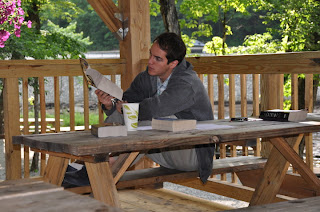How do you define Sacred Space? Is it in the church sanctuary? Could it
possibly be at the altar which was intended specifically to create sacred
space? Many consider a mountain top to be sacred space. For others, like
myself, sacred space may even be found on a river.
Sacred space signifies separateness or
distinctness from the ordinary, or the “profane.” God is called the “Holy One,”
a term that denotes His absolute “uncommonness” to all human experience. Times
and places in which God appears to people become holy simply by being places of
divine encounter.
Sacred Space should be Transformational.
As part of my reading through the Bible in a year with a young adult study group, I am in the process of reading about the Israelites wilderness experience, the construction and rules around worshipping in the Tabernacle, and the challenge of being transformed into the people of God.
This was especially true in the Old Testament as the displaced people of Israel tried to make sense of their new lives and the possibility of being led by God. It was clear to the Israelites that Yahweh was not common. The people were to treat anything associated with God unlike anything in the everyday world. And yet, God offers to come into our everyday lives to make what has been separated from divine intention and transform and restore us into his image.
Transformation is an ongoing process.
Sacred space it seems might be created by God to
help us experience the divine in new and significant ways. It may also be
created by us in an effort to search for God, to experience the divine on a
regular basis.
In his book “Why Jesus?” William Willimon offered
an insightful perspective on this transformation.
“Jesus tends to come to people where they are but rarely leaves them as they were. Conversion of thought and life, a whole new world, is part of the adventure of being loved by Jesus . . . 'If anyone is in Christ - new creation!' That's bad news for those who are complacent with the world as it is; good news for those who think that they may have been created for more than merely present arrangements.”
Sometimes Sacred Space comes in surprising ways.
Jesus created sacred space around the table for a
diverse range of people. There were the obvious choices he made by inviting
some of the religious leaders, friends and family. But most notably, there were
the marginalized. The people that were invited didn’t seem to fit in; certainly
not at a table with God.
Jesus’ table was a place where the marginalized
could experience the divine in a very personal way. Stone Soup is just such a
place for our community. It is sacred space created for the restoration and
transformation of a diverse group of people that have come to God’s table.
How have you created Sacred Space for yourself?
Have you created Sacred Space for yourself to
experience the divine on a daily basis? Maybe it is a special time and/or place
for a daily devotional, Bible reading and prayer. It is critical for our lives
as Christians to spend time creating space to experience God’s presence. We often
find ourselves lost in the wilderness with no hope of seeing the Promised Land
and our Sacred Spaces give us healing, hope and time to reflect on a path
forward.
I encourage you to find the time and space that
will be transformative for you. It is not always easy, but it is always worth
the effort.
I pray God’s blessings on you for your sacred
journey.



